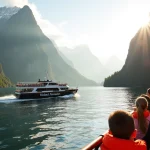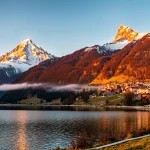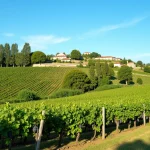Overview of the Best UK Campsites for Wildlife Enthusiasts
For nature lovers, UK campsites offer a unique opportunity to embrace wildlife camping amidst breathtaking landscapes. An ideal campsite for wildlife enthusiasts is one that prioritizes nature immersion and maintains a balance between convenience and environmental conservation. Look for campsites that are tucked away in nature reserves or near wildlife habitats, offering a front-row seat to the splendours of British flora and fauna.
Engaging in wildlife-friendly camping practices is essential to protect the beloved natural settings. Campers are encouraged to minimise their ecological footprint by adhering to the “Leave No Trace” principle, ensuring all waste is managed responsibly. This conscientious approach not only preserves the integrity of natural habitats but also enhances the overall wildlife camping experience. Selecting campsites with eco-friendly amenities and supporting operations committed to conservation are excellent ways to contribute positively while enjoying the great outdoors.
Also read : Discover Tranquil UK Campsites Perfect for a Serene Getaway
Connecting with nature through camping offers unmatched benefits, from stress relief to a greater appreciation for biodiversity. Nature immersion leads to improved mental health, physical wellbeing, and a more profound understanding of the environment. Witnessing wildlife in its natural habitat is thrilling and inspiring, providing memorable experiences that encourage a deeper respect for the delicate balance between humans and nature. Enjoy your adventure while fostering a harmonious relationship with the wild.
Top UK Campsites for Wildlife Observation
Exploring the best campsites UK offers fascinating opportunities for wildlife observation, immersing campers in natural beauty and biodiversity.
Topic to read : Top Insider Tips for Camping Near Stunning Waterfalls in the UK
Campsite 1: Location and Highlights
This campsite, nestled in the heart of a lush national park, is renowned for its unique wildlife experiences. Visitors often spot red deer and an array of bird species unique to the area. The park provides essential amenities such as shower facilities, picnic areas, and a small shop for camping essentials. Accessibility is seamless, thanks to well-maintained transport links, and nearby attractions include a charming village with a history museum and delightful local eateries.
Campsite 2: Location and Highlights
Located on the serene edges of a picturesque lake, this campsite offers breathtaking views and abundant opportunities for wildlife observation. Campers can enjoy spotting otters and numerous waterfowl in their natural habitat. The site features modern conveniences like electricity hook-ups and barbeque pits, enhancing comfort. Accessibility is robust, with the campsite situated near major roads, and visitors can explore walking trails and a quaint nearby town famous for its heritage sites.
Campsite 3: Location and Highlights
Situated in a sprawling coastal reserve, this campsite is perfect for those keen on observing marine wildlife. Frequently spotted dolphins and seals provide unforgettable experiences. Campers benefit from amenities such as communal kitchens and eco-friendly shower blocks. The site is conveniently accessible by road and public transport, with nearby attractions including a vibrant coastal city known for its arts scene and fresh seafood markets.
Wildlife Watching Tips for Campers
When embarking on a camping adventure, embracing wildlife watching can elevate the experience. To maximise your chances of remarkable sightings, observing wildlife during dawn and dusk is optimal. Animals are generally more active during these times, providing campers with mesmerizing views of nature’s array.
When preparing for a wildlife observation, essential gear includes:
- Binoculars or monoculars for a close look without disturbing the creatures.
- A notebook to jot down observations.
- An identification guidebook to recognise various species.
- Camouflage clothing to blend in with the surroundings.
Approaching wildlife with respect is crucial. Always maintain a safe distance to avoid stress to the animals and yourself. It’s vital to steer clear of nesting or breeding areas and never feed wildlife. Such actions can disrupt their natural behaviours.
Consider these wildlife watching tips as part of responsible camping etiquette. Beyond simply observing, respecting the delicate balance of ecosystems helps preserve these magical moments for future campers. Embrace these insights, and relish in the serene beauty of nature.
Visitor Reviews and Experiences
Exploring a campsite often starts with campsite reviews, offering insights into the camping experiences of previous visitors.
Featured Testimonials
Campers frequently highlight notable positive aspects of their stay. Many enjoy the pristine nature, with vibrant landscapes offering a serene escape from city life. Wildlife encounters add an element of surprise, making experiences enriching and memorable. Some campers have spotted majestic deer near their tents, while others have enjoyed birdwatching, observing rare species. Overall, impressions generally convey a deep appreciation for the setting, enhancing their camping experiences.
Lessons Learned from Campers
Understanding the challenges faced by fellow adventurers gives valuable perspective. A common issue is unpredictable weather, prompting seasoned campers to recommend checking forecasts in advance and investing in quality gear. Another challenge is navigating the terrain; hence, a detailed map is considered essential. Notable experiences like learning how to start a fire efficiently or setting up camp quickly have been shared as part of the communal wisdom. Recommendations often include packing ample food and maintaining a sustainable camping practice to preserve nature for future visitors. Such learning experiences and shared advice help make future trips smoother and more enjoyable.
Activities for Nature Lovers at Campsites
Engaging with nature through camping activities offers a myriad of opportunities for enthusiasts to immerse themselves in the great outdoors. One popular choice is participating in guided nature walks and educational programs. These activities provide guests with in-depth knowledge about the local flora and fauna, fostering a deeper appreciation for the environment.
For those with a keen eye and love for creativity, camping sites often feature opportunities for photography and wildlife journaling. Capturing the serene beauty of nature or documenting unique wildlife sightings can be both fulfilling and artistically rewarding.
In addition to these quieter pursuits, there are numerous outdoor activities that cater to adrenaline seekers or those simply wishing to explore more of their surroundings. Kayaking allows campers to explore tranquil lakes and discover hidden waterways firsthand. Meanwhile, avid birdwatchers can delight in spotting a variety of species, perhaps even rare ones, in their natural habitat.
As the sun sets, a new adventure begins—stargazing. With minimal light pollution, campsites become prime locations for observing the cosmos. The dazzling array of stars and constellations visible in such pristine conditions can provide a breathtaking end to a day filled with exploration and discovery.
Best Seasons to Visit for Wildlife Encounters
Exploring the optimal seasons for enjoying rich wildlife encounters can enhance your camping experience. Seasonal changes significantly influence animal behaviours and patterns, which can make or break your wildlife sightings.
Understanding the seasonal wildlife behaviors and migrations allows you to plan your camping trips effectively. For instance, spring is often considered ideal for witnessing migratory birds returning to their nesting grounds. This season is also when many animals give birth, resulting in the delightful sight of emerging young.
The impact of weather on wildlife visibility is another critical factor. For example, in autumn, certain regions might showcase deer during their rutting season, while cooler temperatures can also encourage animals to be more active during daylight hours. Conversely, in summer, many animals tend to retreat into cooler shades, reducing the likelihood of sightings during the heat of the day.
Notably, events and festivals related to wildlife can offer additional opportunities for wildlife enthusiasts. These events, such as bird-watching festivals in spring or whale-watching tours in winter, are often strategically timed to coincide with peak animal activity.
To maximise your wildlife encounters, research the specific camping destinations and tailor your visits to align with these seasonal spectacles. Embrace these seasonal differences to ensure unforgettable moments in the wild.
Conservation Efforts and Sustainable Camping
Camping has long been a beloved way to connect with nature, yet it’s crucial to adopt conservation camping practices to safeguard wildlife. Minimizing human impact ensures that natural habitats remain undisturbed, preserving ecosystems for generations to come.
To contribute to local conservation efforts, campers can engage in various sustainable practices. Start by adhering to the “Leave No Trace” principle, which involves cleaning up your campsite and ensuring no waste is left behind. Additionally, sticking to designated trails and campsites reduces the risk of disturbing wildlife habitats and vegetation.
Supporting conservation camping initiatives can also be as easy as choosing eco-friendly camping gear. Look for sustainable products made from recycled materials or those promoting energy efficiency. Furthermore, participating in organised eco-friendly camping outings or volunteering with local conservation groups can significantly impact preserving the environment.
For those eager to learn more, numerous resources are available online, offering guidance on sustainable practices. Websites focused on camping ethics provide valuable information on minimizing environmental footprints and tips for environmentally conscious campers. By embracing these strategies, campers not only enhance their experience but also contribute positively to the planet, ensuring the preservation of pristine landscapes for future adventurers.






